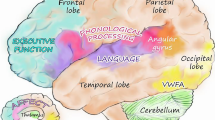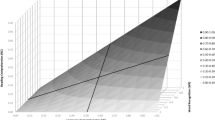Abstract
Many studies have found that phonologicaldeficits in poor readers are associated withdeficits in speech perception. Two hypotheseshave been proposed concerning the nature of thelatter: a speech-specific and a generalauditory hypothesis. The main topic of thepaper is the general auditory hypothesis andits special form as proposed by Tallal and hercolleagues (1993). Thepaper reviews the evidence for these hypothesesand finds it to be either purely correlationalor flawed by misinterpretation of resultsand/or lack of necessary experimental controls.Moreover, a recent control study, the first ofits kind, found no support for Tallal's specialform of the general auditory hypothesis. Thepaper concludes that deficits in speechperception often observed in impaired readersare phonetic (speech-specific), not auditory,in origin.
Similar content being viewed by others
References
Benasich, A. (1998). Temporal integration as an early predictor of speech and language development. In: C. von Euler, I. Lundberg, I. & R. Llinas (eds.), Basic mechanisms in cognition and language (pp. 123-142. New York: Elsevier.
Benasich, A. & Tallal, P. (1996). Auditory temporal processing thresholds, habituation, and recognition memory over the 1st year, Infant Behavior and Development 19: 339-357.
Best, C.T. & Avery, R.A. (1999). Left hemisphere advantage for click consonants is determined by linguistic significance and experience, Psychological Science 10: 65-70.
Bishop, D.V.M., Carlyon, R.P., Deeks, J.M. & Bishop, S.J. (1999). Auditory temporal processing impairment: Neither necessary nor sufficient for causing language impairment in children, Journal of Speech, Language, and Hearing Research 42: 1295-1310.
Blumstein, S.E., Tartter, V.C., Nigro, G. & Statlender, S. (1984). Acoustic cues for the perception of place of articulation in aphasia, Brain and Language 22: 128-149.
Bradlow, A.R., Kraus, N., Nicol, T.G., McGee, T.J., Cunningham, J., Zecker, S.G. & Carrell, T.D. (1999). Effects of lengthened formant transition duration on discrimination and neural representation of synthetic CV syllables by normal and learning-disabled children, Journal of the Acoustical Society of America 106: 2086-2096.
Brady, S.A. & Shankweiler, D.P. (eds.) (1991). Phonological processes in literacy. Hillsdale, NJ: Erlbaum.
Efron, R. (1963). Temporal perception, aphasia and déjà-vu, Brain 86: 403-424.
Hari, R. & Kiesila, P. (1996). Deficit of temporal auditory processing in dyslexic adults, Neuroscience Letters 205: 138-140.
Kinsbourne, M., Rufo, D.T., Gamzu, E., Palmer, R.L. & Berliner, A.K. (1991). Neuropsychological deficits in adults with dyslexia, Developmental Medicine and Child Neurology 3: 763-775.
Lacerda, F. & Lindblom, B. (1998). Some remarks on Tallal's transform in the light of emergent phonology. In: C. von Euler, I. Lundberg & R. Llinas (eds.), Basic mechanisms in cognition and language (pp. 197-222. New York: Elsevier.
Liberman, A.M. (1998). The biology of speech: Two theories. In: C. von Euler, I. Lundberg, & R. Llinas (eds.), Basic mechanisms in cognition and language (pp. 223-229. New York: Elsevier.
Liberman, A.M., Cooper, F.S., Shankweiler, D.P. & Studdert-Kennedy M. (1967). Perception of the speech code, Psychological Review 74: 431-461.
Liberman, I.Y. (1973). Segmentation of the spoken word, Bulletin of the Orton Society 23: 65-77.
Lindblom, B. (1992). Phonological units as adaptive emergents of lexical development. In: C.A. Ferguson, L. Menn & E. Stoel-Gammon (eds.), Phonological development (pp. 131-163. Timonium, MD: York Press.
Lindblom, B., MacNeilage, P. & Studdert-Kennedy, M. (1984). Self-organizing processes and the explanation of phonological universals. In: B. Butterworth, B. Comrie & O. Dahl (eds.), Explanations of language universals (pp. 181-203. New York: Mouton.
Locke, J. (1998). Early developmental delay: Problems for the theorist. In: C. von Euler, I. Lundberg & R. Llinas (eds.), Basic mechanisms in cognition and language (pp. 231-242. New York: Elsevier.
McAnally, K.I., Hansen, P.C., Cornelissen, P.L. & Stein, J.F. (1997). Effect of time and frequency manipulation on syllable perception in developmental dyslexics, Journal of Speech, Language, and Hearing Research 40: 912-924.
Merzenich, M.M., Jenkins, W.M., Johnston P., Schreiner, C., Miller, S.L. & Tallal, P. (1996). Temporal processing deficits of language-learning impaired children ameliorated by training, Science 271: 77-81.
Merzenich, M.M., Miller, S., Jenkins, W.M., Saunders, G., Protopapas, A., Peterson, B. & Tallal, P. (1998). Amelioration of the acoustic and speech reception deficits underlying language-based learning impairments. In: C. von Euler, I. Lundberg & R. Llinas (eds.), Basic mechanisms in cognition and language (pp. 143-172. New York: Elsevier.
Mody, M., Studdert-Kennedy, M. & Brady, S. (1997). Speech perception deficits in poor readers: Auditory processing or phonological coding?, Journal of Experimental Child Psychology 64: 199-231.
Nicholson, R.I. & Fawcett, A.J. (1994). Reaction times and dyslexia, Quarterly Journal of Experimental Psychology: Human Experimental Psychology 47A: 29-48.
Nittrouer, S. (1996). The relation between speech perception and phoneme awareness: Evidence from low-SES children with chronic OM, Journal of Speech and Hearing Research 39: 1059-1070.
Nittrouer, S. (1999). Do temporal processing deficits cause phonological processing problems? Journal of Speech, Language, and Hearing Research 42: 925-942.
Reed,M.A. (1989). Speech perception and the discrimination of brief auditory cues in reading disabled children, Journal of Experimental Child Psychology 48: 270-292.
Riedel, K. & Studdert-Kennedy, M. (1985). Extending formant transitions may not improve aphasics' perception of stop consonant place of articulation, Brain and Language 24: 223-232.
Schwartz, J. & Tallal, P. (1980). Rate of acoustic change may underlie hemispheric specialization for speech perception, Science 207: 1380-1381.
Stein, J.F. & McAnally, K. (1995). Auditory temporal processing in developmental dyslexics, Irish Journal of Psychology 16: 220-228.
Studdert-Kennedy, M. (1987). The phoneme as a perceptuomotor structure. In: A. Allport, D. MacKay, W. Prinz & E. Scheerer (eds.), Language perception and production (pp. 67-84. New York: Academic Press.
Studdert-Kennedy, M. (1989). The early development of phonology. In: C. von Euler, H. Forssberg & H. Lagercrantz (eds.), Neurobiology of early infant behavior (pp. 287-301. New York: Stockton.
Studdert-Kennedy, M. & Mody, M. (1995). Auditory temporal perception deficits in the reading-impaired: A critical review of the evidence, Psychonomic Bulletin and Review 2: 508-514.
Studdert-Kennedy, M. & Shankweiler, D. (1981). Hemispheric specialization for language processes, Science 211: 960-961.
Studdert-Kennedy, M., Mody, M. & Brady, S. (2000). Speech perception deficits in poor readers: A reply to Denenberg's critique, Journal of Learning Disabilities 33(4).
Studdert-Kennedy, M., Liberman, A.M., Brady, S.A., Fowler, A.E., Mody, M. & Shankweiler, D.P. (1995). Lengthened formant transitions are irrelevant to the improvement of speech and language impairments, Haskins Laboratories Status Report on Speech Research SR 119/120: 35-38.
Swisher, L. & Hirsh, I.J. (1972). Brain damage and the ordering of two temporally successive stimuli, Neuropsychologia 10: 137-152.
Tallal, P. (1980). Auditory temporal perception, phonics and reading disabilities in children, Brain and Language 9: 182-198.
Tallal, P. & Newcombe, F. (1978). Impairment of auditory perception and language comprehension in dysphasia, Brain and Language 5: 13-24.
Tallal, P. & Piercy, M. (1973). Developmental aphasia: Impaired rate of nonverbal processing as a function of sensory modality, Neuropsychologia 11: 389-398.
Tallal, P. & Piercy, M. (1974). Developmental aphasia: Rate of auditory processing and selective impairment of consonant perception, Neuropsychologia 12: 83-93.
Tallal, P. & Piercy, M. (1975). Developmental aphasia: The perception of brief vowels and extended stop consonants, Neuropsychologia 13: 69-74.
Tallal, P., Miller, S. & Fitch, R.H. (1993). Neurobiological basis of speech: A case for the preeminence of temporal processing. In: P. Tallal, A.M. Galaburda, R.R. Llinas & C. von Euler (eds.), Temporal information processing in the nervous system. Annals of the New York Academy of Sciences, Vol. 82 (pp. 27-47). New York: New York Academy of Sciences. Paper reprinted in Irish Journal of Psychology (1995), 16: 194-219.
Tallal, P., Miller, S.L., Bedi, G., Byma, G., Wang, X, Nagarajan, S.S., Schreiner, C., Jenkins,W.M. & Merzenich, M.M. (1996). Language comprehension in language-learning impaired children improved with acoustically modified speech, Science 271: 81-84.
Author information
Authors and Affiliations
Corresponding author
Rights and permissions
About this article
Cite this article
Studdert-Kennedy, M. Deficits in phoneme awareness do not arise from failures in rapid auditory processing. Reading and Writing 15, 5–14 (2002). https://doi.org/10.1023/A:1013812219382
Issue Date:
DOI: https://doi.org/10.1023/A:1013812219382




